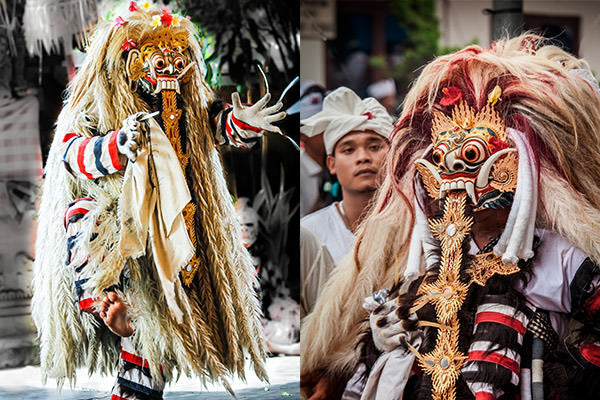The Island of Bali is a veritable matrix of art and culture admired by the entire world, whose mix of theater and dance has given rise to very characteristic traditional customs . This artistic pillar is very important for the Indonesian tradition, as well as religiosity, being central bases for the local society.
Historical tales and the worship of the gods are themes that are always present in the middle of the dance. And although the movements differ from each other, they all have meanings within the culture expressed through staging and handicrafts . The dance itself is a separate attraction that unites detailed clothing and striking expressions of the dancers, imposing originality in the look and gestures.

Balinese artistic staging filled with accessories. Photo: reproduction
Barong dance , one of the most characteristic of Indonesia , portrays a contrast between good and evil . Barong , a protective amulet from the island of Bali, is characterized by the figure of an animal with large pointed teeth, bulging eyes and a body covered in fur.
Depicting the demon queen , "devourer of children", known as Rangda , she leads an army of evil wizards against the leader of the forces of good. In Hindu culture, she is described as an elderly woman, almost naked, with long and disheveled hair, hanging breasts and claws.

Figure of Rangda represented in a theatrical staging. Photo: reproduction
The Kecak dance is considered to be "the monkey dance", originating from an exorcism dance called the Sanghyang . Its musical arrangement is made by dozens of men who create exceptional sounds: nasal, bass, strident, blows and noises. It represents the story of Prince Rama rescuing his wife Sita , kidnapped by the demon Rawana , king of Lanka, which, again, demonstrates the battle of good against evil.
It is held at the Uluwatu Temple, strategically built on top of the cliff of the Bukit peninsula to scare away evil spirits from the southeast. It is one of the oldest and most important temples in Bali.

Kecak, also known as ''The Monkey Dance''. Photo: reproduction
Lelong dance emerged in the 19th century as entertainment. Traditionally, Lelong dancers were girls who had not yet reached puberty. At the time, they were considered important in society, but after marriage, they had to retire from professional dancing. There are several Lelong dances, which are distinguished by movements, gestures and narratives.

Unusual facial expressions and costumes from the Balinese dance Lelong. Photo: reproduction
Bali is rich in culture and handicrafts . Find decorative arts imported from Bali at the Art & Tune store, such as sculptures and masks by Barong and Rama and Sita to make the environment enchanting!

Shop specializing in handmade products imported from Bali.
Gabriel Alvares Prist - Art & Tune











2 comments
Adoro o folclore balinês… o colorido das roupas… os adereços de cabeça… as expressões faciais nas danças.
Abraço desde Porto Alegre, Brasil
Me encantam